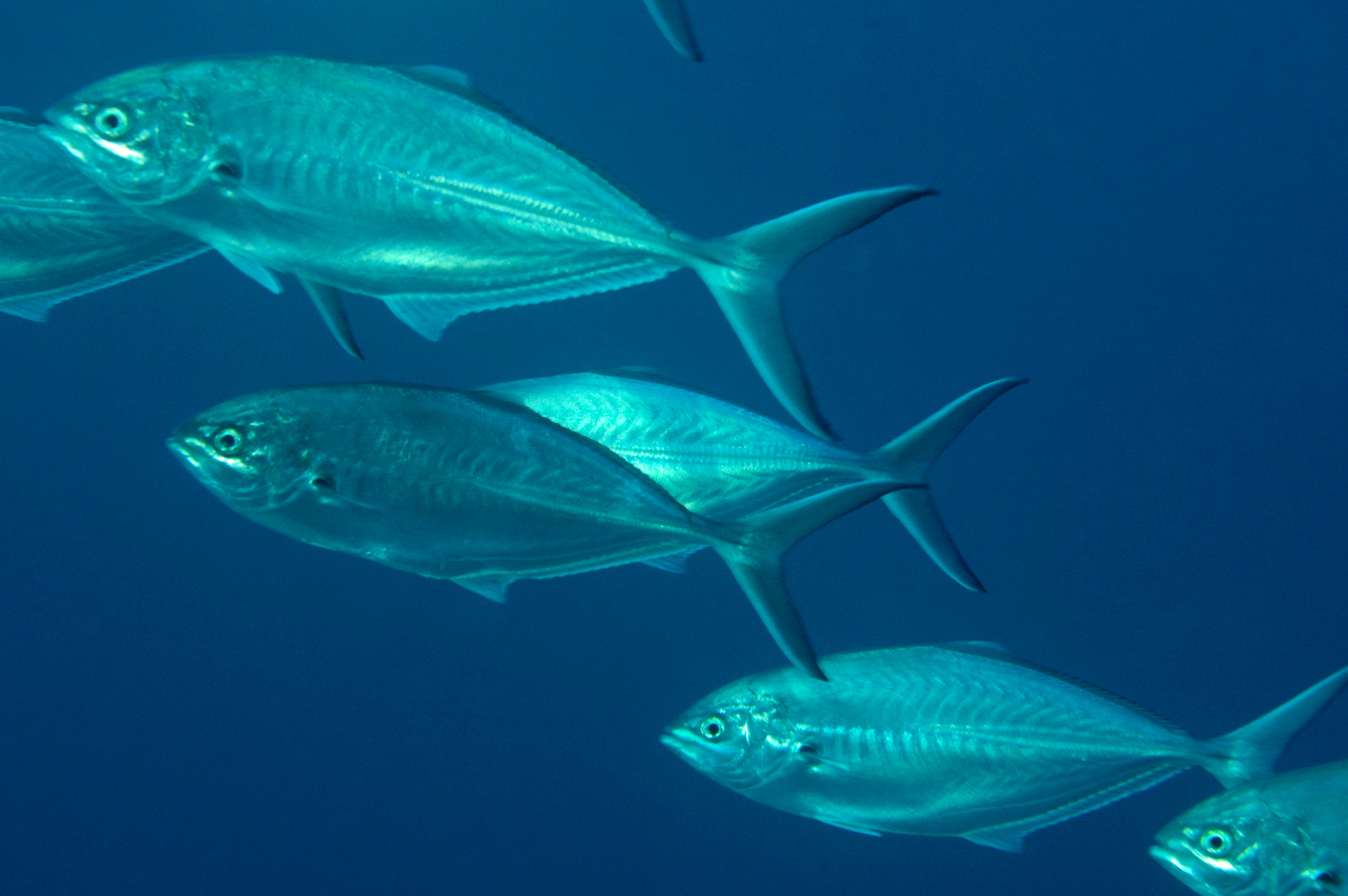Herring Scad, Alepes vari (Cuvier 1833)
Other Names: Deep-bodied Crevalle, Duskyfin Crevalle, Trevally Scad

Herring Scad, Alepes vari, in Southeast Asia, December 2012. Source: Keith Wilson / Flickr. License: CC by Attribution-NonCommercial
Summary:
A greyish-blue to bluish-green scad fading to a silvery-white below, with a large diffuse dusky blotch on the upper margin of the gill cover, and the spinous dorsal fin, soft dorsal and anal fin lobes, and pelvic fins are darker in males than females.
Cite this page as:
Bray, D.J. 2019, Alepes vari in Fishes of Australia, accessed 03 Jul 2025, https://fishesofaustralia.net.au/Home/species/4255
Herring Scad, Alepes vari (Cuvier 1833)
More Info
|
Distribution |
Ningaloo Reef, Western Australia, to south of Cooktown, Queensland. Elsewhere the species is widespread in the tropical Indo-west Pacific from the Red Sea and Persian Gulf to Korea and the Ryukyu Islands, south to northern Australia and New Caledonia. Forms dense pelagic schools on clear coastal and offshore reefs, swimming well above the bottom, often near the surface. |
|
Features |
Gill rakers 9-12 + 23-27 = 32-38. Supramaxilla relatively long, with an anterior spine-like projection; 48-69 scutes in the straight part of the lateral line; adipose eyelid well developed only on the posterior half of the eye. |
|
Feeding |
Feeds mostly on crustaceans and small fishes. |
|
Fisheries |
Taken in commercial hook and line fisheries. |
|
Species Citation |
Caranx vari Cuvier in Cuvier & Valenciennes 1833, Histoire Naturelle des Poissons 9: 48. Type locality: Pondicherry, India. |
|
Author |
Bray, D.J. 2019 |
|
Resources |
Herring Scad, Alepes vari (Cuvier 1833)
References
Allen, G.R. & Erdmann, M.V. 2012. Reef fishes of the East Indies. Perth : Tropical Reef Research 3 vols, 1260 pp.
Collen, B., Richman, N., Beresford, A., Chenery, A. & Ram, M. (Sampled Red List Index Coordinating Team) 2010. Alepes vari. The IUCN Red List of Threatened Species 2010: e.T155134A4725434. http://dx.doi.org/10.2305/IUCN.UK.2010-4.RLTS.T155134A4725434.en. Downloaded on 18 January 2019.
Cuvier, G.L. in Cuvier, G.L. & Valenciennes, A. 1833. Histoire Naturelle des Poissons. Paris : Levrault Vol. 9 512 pp. pls 246-279.
Gloerfelt-Tarp, T. & Kailola, P.J. 1984. Trawled Fishes of Southern Indonesia and Northwest Australia. Jakarta : Dir. Gen. Fish. (Indonesia), German Tech. Coop., Aust. Dev. Ass. Bur. 406 pp.
Gunn, J.S. 1990. A revision of selected genera of the family Carangidae (Pisces) from Australian waters. Records of the Australian Museum, Supplement 12: 1-77. DOI 10.3853/j.0812-7387.12.1990.92 Open access
Kuiter, R.H. 1996. Guide to Sea Fishes of Australia. A comprehensive reference for divers and fishermen. Sydney, NSW, Australia : New Holland Publishers xvii, 434 pp.
Kuiter R.H. & Tonozuka, T. 2001. Indonesian Reef Fishes. Part 1. Eels- Snappers, Muraenidae - Lutjanidae. Melbourne : Zoonetics pp. 1-302.
Larson, H.K. & Williams, R.S. 1997. Darwin Harbour fishes: a survey and annotated checklist. pp. 339-380 in Hanley, H.R., Caswell, G., Megirian, D. & Larson, H.K. (eds) The Marine Flora and Fauna of Darwin Harbour, Northern Territory, Australia. Proceedings of the Sixth International Marine Biology Workshop. Darwin : Museum and Art Gallery of the Northern Territory 466 pp.
Larson, H.K., Williams, R.S. & Hammer, M.P. 2013. An annotated checklist of the fishes of the Northern Territory, Australia. Zootaxa 3696(1): 1-293
Randall, J.E. 2005. Reef and shore fishes of the South Pacific. New Caledonia to Tahiti and the Pitcairn Islands. Honolulu : University of Hawaii Press 707 pp.
Smith-Vaniz, W.F. 1999. Family Carangidae. pp. 2659-2756 in Carpenter, K.E. & Niem, T.H. (eds) The Living Marine Resources of the Western Central Pacific. FAO Species Identification Guide for Fisheries Purposes. Rome : FAO Vol. 4 pp. 2069-2790.





